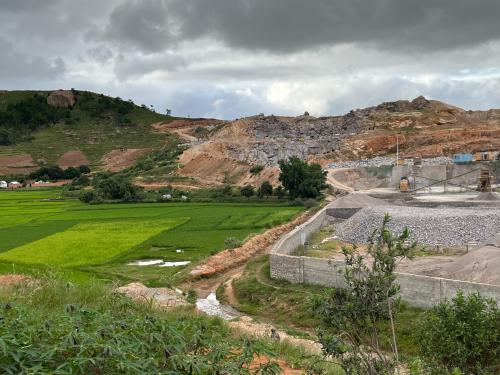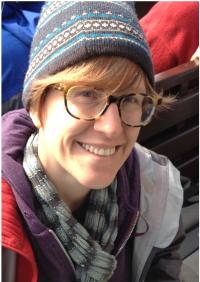
The McDonald Institute for Archaeological Research hosts a keynote Annual Lecture delivered by eminent, international scholars on a wide range of archaeological research which crosses continents, periods and approaches in its exploration of the diversity of the human past.
The Thirty-seventh McDonald Annual Lecture 'After Landscape'*
will be given by Dr Zoë Crossland, Columbia University
at 5.00pm on Wednesday 26th November
The Yusuf Hamied Centre, Christ's College

Abstract:
We’re living in a world in which historic landscapes are being destroyed and remade at an unprecedented scale. Humans have reshaped the very geology of the planet, as debates over the Anthropocene have highlighted. Increasingly, notions of landscape seem to exist as a nostalgic retreat or as something to be saved. And yet landscape aesthetics are also implicated in modernity’s destructions, emerging alongside and underwritten by the European colonial project, enclosure, and the plantation.
What might happen to the archaeological study of place if we take up postcolonial critiques of landscape's provincialism, and posthumanist challenges to its centering of human subjectivity? What questions and perspectives might this open up for contemporary research? In a world where researchers ask whether glaciers listen, and how forests think, what is left for landscape study? How might we start to think place differently as archaeologists, and how might this help us engage with the challenges of the contemporary world?
I explore this question in the context of the historical reshaping of rice landscapes in highland Madagascar, taking my cue from the remembered speeches of the 18th century king of highland Madagascar who insisted that “rice is my friend and my equal”. This offers a different starting point from which to explore the politics and histories of place, with resonances that go well beyond highland Madagascar.
Biography:

Zoë Crossland is Professor of Anthropology and Director of Graduate Studies in Anthropology at Columbia University. From 2017 to 2025 she directed the Columbia Center for Archaeology. Her research focuses on the historical archaeology of Madagascar, as well as forensic archaeology and evidentiary practices around human remains. She draws on semiotic theory to study archaeology's relationship to the past and the dead. Her publications include Ancestral Encounters in Highland Madagascar. Material Signs and Traces of the Dead (Cambridge 2014) and, in collaboration with Rosemary Joyce, Disturbing Bodies. Perspectives on Forensic Archaeology (SAR 2015). She is currently co-editing The Malagasy World with Chantal Radimilahy and Kristina Douglass (Routledge), which compiles what is known about the archaeology of the island of Madagascar. Crossland co-directs the Sacred Rice Project with colleagues from the University of Antananarivo, Madagascar. She is the chair of the North American division of the Theoretical Archaeology Group.
* Please be aware that a photographer and filming team from or commissioned by the University of Cambridge will be taking photographs and a film of the Annual Lecture. The photographs and films may be published, transmitted or broadcast in official University publications and in University publicity materials included in University and others’ websites and social media.
Recent McDonald Annual Lecture speakers:
- 2024: Professor Alfredo González-Ruibal (Incipit-CSIC) - Modernity and the end of globalization
- 2023: Professor David Wengrow (University College London) - What might an archaeology of freedom look like?
- 2022: Professor Amy Bogaard (University of Oxford) - Prehistoric farming futures? Recent insights from western Asia and Europe
- 2021: Professor Alison Wylie (University of British Columbia) - Bearing Witness: Collaborative Archaeology in a Settler Colonial Context
- 2020: Professor Robert Foley (University of Cambridge) - The fourth handshake: selection, diversity and ecology in human evolutionary studies
- 2019: Professor Shadreck Chirikure (University of Cape Town, University of Oxford) - The Political Economy of Precolonial African States - Metals, Trinkets, Land, etc, etc
- 2018: Professor Roberta Gilchrist (University of Reading) - The Medieval Ritual Landscape: Archaeology and Folk Religion
- 2017: Jean-Jacques Hublin, (Max Planck Institute for Evolutionary Anthropology in Leipzig) - Modern Human Origins: In Search of a Garden of Eden
- 2016: Eske Willerslev, (University of Cambridge and University of Copenhagen) - Human migration and mega faunal extinctions
- 2015: Norman Yoffee (University of Michigan, Institute for the Study of the Ancient World, New York University) - Counternarratives of Early States in Mesopotamia (and Elsewhere)
- 2014: Graeme Barker, (University of Cambridge) - The archaeology of climate/people interactions: science or story telling?
- 2013: Christine Hastorf (University of Berkeley) - Houses, food and distributed people in the later Prehistory of the Central Andes (AD1000-1500)



